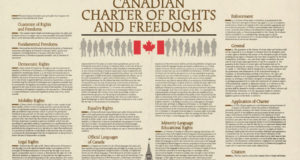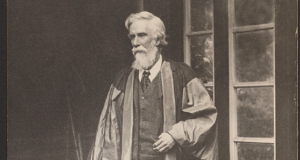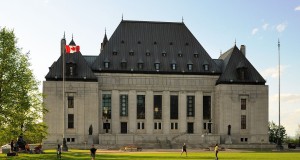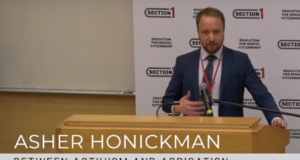This is the second of a two-part essay written by Professor Maxime St-Hilaire and Xavier Foccroulle Ménard. Part I can be read here. Assessment of the Fourth Argument on British, Australian and New Zealand Law While not convincing, we find the comparative argument to have more weight, and this despite the following clarification. Grégoire Webber, Eric Mendelshon and Robert Leckey give two examples taken from Australian law: that of the Human ...
Read More »Recent Posts
Nothing to Declare: A Response to Grégoire Webber, Eric Mendelsohn, Robert Leckey and Léonid Sirota on the Effects of the Notwithstanding Clause
The following is the first in a two-part series. Part II will be published next week. Introduction In the wake of the legal challenge to Quebec’s law on state secularism,[1] Professor Grégoire Webber, lawyer Eric Mendelsohn and Dean Robert Leckey jointly published a post in which they argue that the invocation of the “notwithstanding clause” in s.33 of the Canadian Charter of Rights and Freedoms does not preclude a court from making a declaration on ...
Read More »The Constitutional Basis for Judicial Review in Canada
In the wake of the Supreme Court of Canada’s decision in Vavilov, I’ve decided to pick up a copy of A.V. Dicey’s Introduction to the Study of the Law of the Constitution. I had read passages from this book more than a decade ago when I was in law school, but very little since beyond the odd paragraph. Dicey’s book is valuable primarily as a historical work. It lays ...
Read More »20 Things to Be Grateful For as Administrative Law Enters the 2020s – Part III
So here we are, on the penultimate day of 2019. When this year began, I was not at all optimistic that the state of administrative law would improve with Vavilov’s release. But now I’m writing a third blog post on my gratitude! So never say surprises cannot happen… 14) Most alarming interpretations of Newfoundland Nurses repudiated. The Supreme Court’s decision ...
Read More »20 Things to Be Grateful For as Administrative Law Enters the 2020s – Part II
On Monday, I began the expansion of my list of twenty important – and positive – lessons from last week’s Vavilov decision. Now, I continue… 8) Access to justice can be facilitated by either reasonableness or correctness review depending on the circumstances. Defenders of reasonableness review frequently defend it on the basis that it facilitates access to justice. This is ...
Read More »20 Things to Be Grateful For as Administrative Law Enters the 2020s
Humans often don’t evaluate an experience in light of how good it is, but rather against how much it met/failed to meet/exceeded our expectations. And on that front, the Supreme Court’s decision in Minister of Citizenship and Immigration v Vavilov delivered in spades. After years of lamenting administrative law decisions coming from the Supreme Court, we have what looks like ...
Read More »Vavilov: A Step Forward
Today, the Supreme Court of Canada released its decisions in Vavilov and Bell/NFL. I have previously summarized the facts of these cases and analyzed them here (Vavilov) and here (Bell/NFL). Overall, today’s decisions (a 7-2 decision, Abella and Karakatsanis JJ concurring in result) are a net positive for the law of judicial review in Canada. The Court has done a ...
Read More »A Citizen’s Guide to the Rule of Law
The following is an excerpt from the author’s chapter in Constitutional Democracy Under Stress – A Time For Heroic Citizenship, Peter L. Biro (ed.), forthcoming from Mosaic Press, Oakville, Canada The Rule of Law entails the existence of a legal framework, binding at all times on the government and also on individuals in at least some of their interactions with ...
Read More »Easing the Stress on Constitutional Democracy
On October 6, 2019, I had the pleasure of speaking at a conference entitled “Constitutional Democracy Under Stress.” The conference was hosted by Section 1 and its founder, Peter Biro, who incidentally was one of my early mentors when I was a summer student. Mr. Biro, whose article for ARL on the Section 1 project can be read here, gathered ...
Read More »Toronto v Ontario: Correcting Results-Oriented Reasoning
It is not often that I can write a post in full agreement with a judicial decision. Perhaps this says something about my constitution. No matter, the Court of Appeal for Ontario’s recent decision in Toronto v Ontario is an admirable decision that strikes all of the right notes when it comes to interpreting overlapping Charter rights and the use ...
Read More » Advocates for the Rule of Law
Advocates for the Rule of Law









